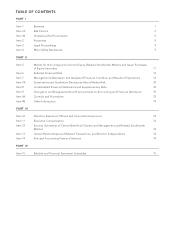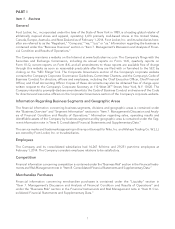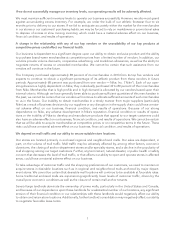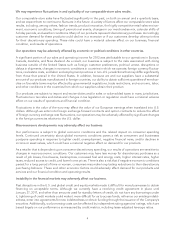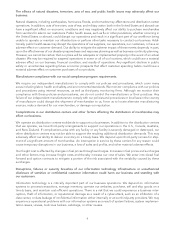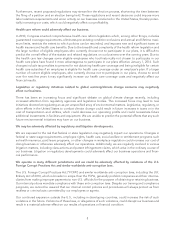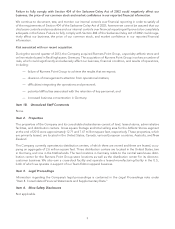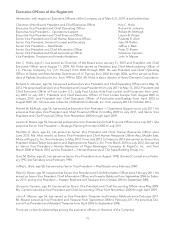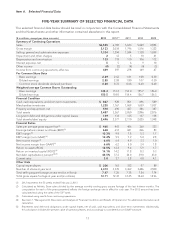Foot Locker 2013 Annual Report Download - page 29
Download and view the complete annual report
Please find page 29 of the 2013 Foot Locker annual report below. You can navigate through the pages in the report by either clicking on the pages listed below, or by using the keyword search tool below to find specific information within the annual report.The effects of natural disasters, terrorism, acts of war, and public health issues may adversely affect our
business.
Natural disasters, including earthquakes, hurricanes, floods, and tornados may affect store and distribution center
operations. In addition, acts of terrorism, acts of war, and military action both in the United States and abroad can
have a significant effect on economic conditions and may negatively affect our ability to purchase merchandise
from vendors for sale to our customers. Public health issues, such as flu or other pandemics, whether occurring in
the United States or abroad, could disrupt our operations and result in a significant part of our workforce being
unable to operate or maintain our infrastructure or perform other tasks necessary to conduct our business. Addi-
tionally, public health issues may disrupt the operations of our suppliers, our operations, our customers, or have an
adverse effect on customer demand. Our ability to mitigate the adverse impact of these events depends, in part,
upon the effectiveness of our disaster preparedness and response planning as well as business continuity planning.
However, we cannot be certain that our plans will be adequate or implemented properly in the event of an actual
disaster. We may be required to suspend operations in some or all of our locations, which could have a material
adverse effect on our business, financial condition, and results of operations. Any significant declines in public
safety or uncertainties regarding future economic prospects that affect customer spending habits could have a
material adverse effect on customer purchases of our products.
Manufacturer compliance with our social compliance program requirements.
We require our independent manufacturers to comply with our policies and procedures, which cover many
areas including labor, health and safety, and environmental standards. We monitor compliance with our policies
and procedures using internal resources, as well as third-party monitoring firms. Although we monitor their
compliance with these policies and procedures, we do not control the manufacturers or their practices. Any
failure of our independent manufacturers to comply with our policies and procedures or local laws in the country
of manufacture could disrupt the shipment of merchandise to us, force us to locate alternate manufacturing
sources, reduce demand for our merchandise, or damage our reputation.
Complications in our distribution centers and other factors affecting the distribution of merchandise may
affect our business.
We operate six distribution centers worldwide to support our businesses. In addition to the distribution centers
that we operate, we have third-party arrangements to support our operations in the U.S., Canada, Australia,
and New Zealand. If complications arise with any facility or any facility is severely damaged or destroyed, our
other distribution centers may not be able to support the resulting additional distribution demands. This may
adversely affect our ability to deliver inventory on a timely basis. We depend upon third-party carriers for ship-
ment of a significant amount of merchandise. An interruption in service by these carriers for any reason could
cause temporary disruptions in our business, a loss of sales and profits, and other material adverse effects.
Our freight cost is affected by changes in fuel prices through surcharges. Increases in fuel prices and surcharges
and other factors may increase freight costs and thereby increase our cost of sales. We enter into diesel fuel
forward and option contracts to mitigate a portion of the risk associated with the variability caused by these
surcharges.
Disruptions, failures or security breaches of our information technology infrastructure or unauthorized
disclosure of sensitive or confidential customer information could harm our business and standing with
our customers.
Information technology is a critically important part of our business operations. We depend on information
systems to process transactions, manage inventory, operate our websites, purchase, sell and ship goods on a
timely basis, and maintain cost-efficient operations. There is a risk that we could experience a business inter-
ruption, theft of information, or reputational damage as a result of a cyber-attack, such as an infiltration of a
data center, or data leakage of confidential information either internally or at our third-party providers. We may
experience operational problems with our information systems as a result of system failures, system implemen-
tation issues, viruses, malicious hackers, sabotage, or other causes.
6






